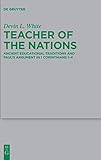Teacher of the Nations : Ancient Educational Traditions and Paul’s Argument in 1 Corinthians 1-4 / Devin L. White.
Material type: TextSeries: Beihefte zur Zeitschrift für die neutestamentliche Wissenschaft ; 227Publisher: Berlin ; Boston : De Gruyter, [2017]Copyright date: ©2017Description: 1 online resource (XIII, 225 p.)Content type:
TextSeries: Beihefte zur Zeitschrift für die neutestamentliche Wissenschaft ; 227Publisher: Berlin ; Boston : De Gruyter, [2017]Copyright date: ©2017Description: 1 online resource (XIII, 225 p.)Content type: - 9783110537857
- 9783110538175
- 9783110539554
- 230
- online - DeGruyter
- Issued also in print.
| Item type | Current library | Call number | URL | Status | Notes | Barcode | |
|---|---|---|---|---|---|---|---|
 eBook
eBook
|
Biblioteca "Angelicum" Pont. Univ. S.Tommaso d'Aquino Nuvola online | online - DeGruyter (Browse shelf(Opens below)) | Online access | Not for loan (Accesso limitato) | Accesso per gli utenti autorizzati / Access for authorized users | (dgr)9783110539554 |
Browsing Biblioteca "Angelicum" Pont. Univ. S.Tommaso d'Aquino shelves, Shelving location: Nuvola online Close shelf browser (Hides shelf browser)
Frontmatter -- Abstract -- Acknowledgements -- Contents -- 1. Introduction: Early Christian Reception of Paul and the Interpretation of 1 Cor 1–4 -- 2. Greek, Roman, and Jewish Educational Institutions: An Overview -- 3. Ancient Education in 1 Cor 3:1–4:21 -- 4. Ancient Education in 1 Cor 1:10–2:16 -- 5. Good Teachers, Bad Students, and the Argument of 1 Cor 1:10–4:21 -- 6. Conclusion: Contributions and Directions for Future Research -- Bibliography -- Index of Subjects -- Index of Authors -- Index of References
restricted access online access with authorization star
http://purl.org/coar/access_right/c_16ec
Scholarship is divided on a point fundamental to the interpretation of 1 Corinthians 1-4: Are these chapters better read as a Pauline apology or as a Pauline censure? This study argues that Paul's argument is simultaneously apology and rebuke. By characterizing the Corinthian community as an ancient school, Paul depicts himself as a good but misunderstood teacher and the Corinthians as lackluster and unruly students. In support of this argument, White identifies numerous parallels between Paul's language, logic, and imagery in 1 Corinthians 1-4 and similar motifs in ancient Greek, Roman, and Jewish discussions of educational theory and practice. Especially significant is White's conclusion that Paul's educational language most closely resembles discussions of ancient primary education, not the rhetoric or philosophy studied in ancient higher education. This book will be of interest to scholars of the Corinthian correspondence, Pauline specialists, and any scholar of antiquity interested in ancient Greek, Roman, Jewish, and Christian education.
This study examines educational motifs in 1 Corinthians 1-4 in order to answer a question fundamental to the interpretation of 1 Corinthians: Do the opening chapters of 1 Corinthians contain a Pauline apology or a Pauline censure? The author argues that Paul characterizes the Corinthian community as an ancient school, a characterization Paul exploits both to defend himself as a good teacher and to censure the Corinthians as poor students.
Issued also in print.
Mode of access: Internet via World Wide Web.
In English.
Description based on online resource; title from PDF title page (publisher's Web site, viewed 28. Feb 2023)









